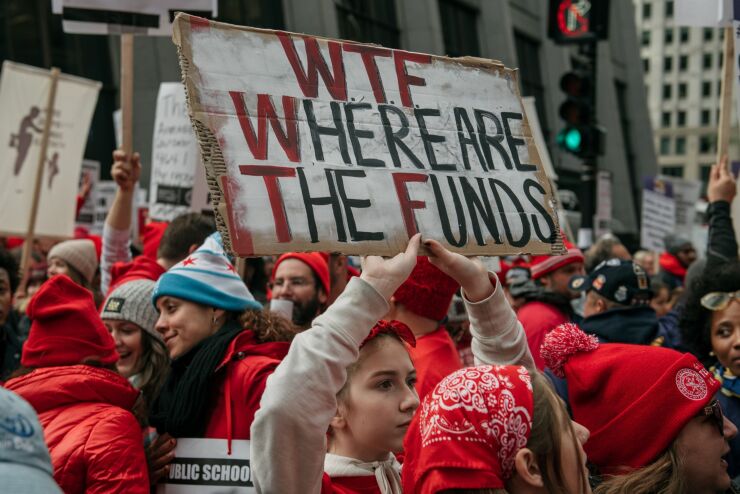Chicago Public Schools proposed an amended fiscal 2020 budget Wednesday to begin absorbing the cost of its up to $1.5 billion, five-year labor deal with teachers after a strike that cost 11 school days.
How the district will tackle the new expense over the long term and whether it will set back fiscal progress achieved over the last two years weighs on the minds of market participants.

“We still need more detail," said Brian Battle, director of trading at Performance Trust Capital Partners LLC. He said investors are still waiting for junk-rated CPS to say how it will fund the deal over the five years.
“If they had it figured out, they would have told us,” he said.
Negotiators for the Chicago Teachers Union, the school district and the city of Chicago cut the deal last week. The union’s House of Delegates approved the contract but it’s not final until rank-and-file teachers sign off it in a vote slated for next week.
The district put a price tag of up to $1.5 billion on the five-year deal that raises salaries, services, and staffing levels to reduce class size and install nurses and social workers in all schools. Mayor Lori Lightfoot and schools chief Janice Jackson had warned that all of the union’s demands carried a $2.4 billion price tag.
The district on Wednesday released an amended budget for $7.84 billion, up from $7.7 billion approved over the summer. The district said $68 million in savings from six canceled school days and $66 million in additional city revenue from the city’s proposed $300 million tax-increment financing surplus — beyond $97 million already included in the fiscal 2020 budget — will help cover the new expenses. Some funding was also built into the original budget to accommodate the expected contract.
New expenses being incorporated into the budget include $61 million that must be paid to the city to reimburse it for non-teacher pension contributions, $33 million in additional teachers’ contract costs, $25 million in reduced short-term borrowing levels, and $15 million to cover the costs of a new, non-teachers’ contract with the service employees' union.
“In the years ahead, costs associated with the CTU and SEIU contracts will increase at an approximately steady rate and be exceeded by the growth in revenue from existing state and local revenue streams. CPS is committed to fiscal responsibility, and the structure of the district’s labor agreements, combined with the revenue sources that are already in place, will ensure that CPS is able to invest in a manner that promotes the district’s continued financial health,” a statement said.
Investors and analysts want more detail.
Absorbing the costs over the long term is tough as cutting costs and raising revenues are both difficult tasks for the district given state caps on its property tax levies and aid levels are set by state formula. Property tax accounts for 44% of district revenue and state aid 34%.

“Growing the pie” in the form of the city’s tax base is the third option that Battle said should be the city’s focus and tax hikes or requests to lift caps can get in the way of potential economic investment and expansion. “Raising taxes is corrosive.”
City and District
With revenue-raising largely outside the school district's powers, analysts are looking closely at the contract for potential implications for Chicago's city government and whether it will called up on to help cover any future costs, said Howard Cure, director municipal research at Evercore Wealth Management. The state, with its own fiscal problems, can’t be expected to step up
“This is going to cost more than was budgeted and it’s not like there a lot of excess revenues around,” Cure said, noting Lightfoot’s reluctance to raise property taxes to balance the city’s books. “I don’t know where this money is going to come from to balance the budget. I think it could slow their fiscal progress.”
Investors and analysts also are pondering how the deal and its terms might impact pending city negotiations with its police and firefighters.
Battle said bondholders can take heart that debt repayment is not threatened. “In the short-term, the bonds are going to be paid and CPS provides an essential service,” which bodes well for maintaining new state aid levels.
The district has seen its spreads on long-term bonds narrow dramatically over the last two years and its short-term rates have come down since winning new state aid and pension help along with a local pension property tax levy and a capital levy over the last several years.
Battle doesn’t see the contract’s cost reversing that trend. “It’s a great time to be a bad issuer,” Battle said of the market’s thirst for debt, especially higher-yielding paper.
Ratings
The district is rated BB by Fitch Ratings, with a stable outlook, and BB-minus by S&P Global Ratings with a positive outlook. Moody’s Investors Service rates CPS B2 with a stable outlook. Kroll Bond Rating Agency is the sole agency to rate CPS GOs at investment grade with BBB and BBB-minus ratings and a positive outlook.
Rating agency analysts said they were still assessing the costs of the contract and expected to talk with CPS finance officials this week.
“What will be key for CPS will be management’s ability to incorporate the increased spending required by the agreement that resolved the teachers’ strike without weakening the district’s overall financial flexibility,” said Fitch Ratings analyst Amy Laskey.
“It's clear to me that this tentative agreement will significantly increase expenditures,” said S&P Global Ratings analyst Blake Yocom. A review of how the district will accommodate the 2020 costs is the first priority, but the long-term impact is central to the district’s future rating trajectory.
“If this opens up a structural deficit the likelihood of an upgrade” fades, but the district has “improved its financials enough so that it’s stable at this level,” Yocom said.
S&P upgraded the district from B-plus in August, a day after Fitch upgraded it from BB.
“They were taking steps forward; this may be a step backward,” Yocom said.
If the district moves in the coming years to dip into reserves that have only just begun to be rebuilt or raises its cash flow borrowing levels that have been trimmed to under $1 billion annually over the last two years then “the rating could be pressured,” Yocom said. The rating agency said further upgrades would depend on whether the district could absorb the cost of the contract.
More than Money
Social and political items emerged as sticking points during the negotiations and municipal market participants are watching for the potential of those themes to spread. The CTU sought to address student homelessness, affordable housing and staffing for counselors and social workers in the contract, subjects that extend beyond core compensation and working conditions that are traditionally negotiated.
That could emerge as a trend, buoyed by CPS’ success on some fronts, in urban districts with strong union foundations.
“Having to deal with social problems detracts from a teacher’s job teaching,” so it’s an important issue but it carries a price tag, Cure said.
Late in negotiations, Lightfoot accused the CTU of injecting politics into the fray by demanding she support legislation broadening the issues that are allowed in collective bargaining and pushing her to support state legislation that would shift CPS to an elected school board from one appointed by the mayor. She endorsed such a shift during her campaign earlier this year but believes a pending bill is flawed.
Democratic leaders said the issue would be debated in the 2020 spring legislative session and that, some market participants believe, is a more material threat than the new contract.
“An elected school board is a real threat to the fiscal health of Chicago Public Schools,” Battle said. For municipal investors, mayoral control means the mayor has skin in the game when it comes to assisting the district if needed and wielding the city's clout with the market and state lawmakers. It also streamlines district decision-making.
The district has been rebuilding its reserves that were drained to deal with $1 billion deficits. The general fund balance stood at $365 million at the close of fiscal 2019.
The board sold tax anticipation notes during the strike that landed at 1.69% rate, a 55 basis point spread to the Municipal Market Data’s AAA 1-year bond. The rate appeared on par to better than other competitively issued TAN sales over the last year. The board’s spreads on long term issuance narrowed earlier this year by 70 bps to a 150 bp spread compared to a sale last year.
CPS operates 659 schools that serve 361,000 students, making it the third-largest public district in the nation.





